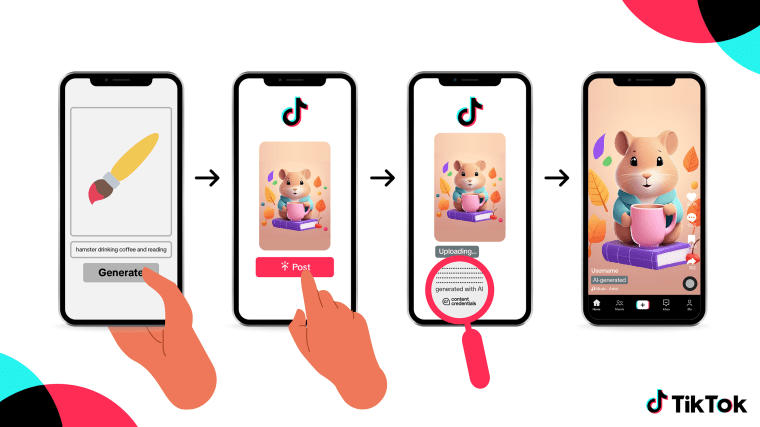TikTok said it will begin automatically labeling artificial intelligence-generated content (AIGC) uploaded from other platforms in an effort to combat misinformation on the app.
“AI-generated content is an incredible creative outlet, but transparency for viewers is critical,” Adam Presser, TikTok's head of operations and trust and safety, said in a statement.
The app, which first announced the news on "Good Morning America" on Thursday, said it is partnering with the Coalition for Content Provenance and Authenticity (C2PA), a project that aims to provide the tools and resources needed for people to identify AI-generated content.
TikTok will use C2PA’s “content credential” technology, which attaches metadata to a piece of content that indicates it was created with AI. It will be attaching content credentials to AI-generated content created on the app in the coming months.
“By partnering with peers to label content across platforms, we’re making it easy for creators to responsibly explore AI-generated content, while continuing to deter the harmful or misleading AIGC that is prohibited on TikTok,” Presser said.
The company's decision comes amid continued concerns over misinformation spreading online ahead of the November presidential election.
Fake, seemingly AI-generated content has continued to fool internet users en masse. Most recently, fake images circulated of Katy Perry and Rihanna posing at the Met Gala, even though neither of the singers were at the event.
“We want to make sure that people have that ability to understand what fact is and what is fiction,” Presser told "GMA."
In September, TikTok rolled out AI-generated tags for creators to add to their videos. It also began labeling filters and effects as AI-generated at the time.
Other tech companies have similarly adopted measures to increase transparency around AI-generated content. In February, Google announced it was joining C2PA and utilizing its content credentials technology. Meanwhile, Meta shared that it would be labeling AI-generated content on Facebook and Instagram ahead of this year's election.
While tech companies have increasingly watermarked AI-generated content, NBC News previously reported that the labels and metadata used to identify AI can be easily sidestepped.
Experts said some labels could be easily cropped or screenshotted away. Still, companies hope to pair watermarking with education on AI.
Alongside the new AI tags, TikTok will be producing 12 videos promoting and teaching media literacy skills in collaboration with Mediawise, a Poynter Institute program that provides resources for discerning misinformation online.
The company said it will also be joining the Adobe-led Content Authenticity Initiative, which seeks to promote transparency and provide context in digital media.
“At a time when any digital content can be altered, it is essential to provide ways for the public to discern what is true,” Adobe Chief Trust Officer Dana Rao said. “Today’s announcement is a critical step towards achieving that outcome.”

